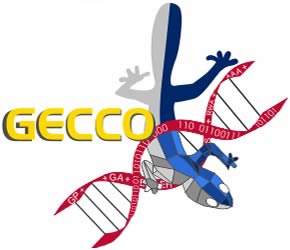Competitions demonstrate how Evolutionary Computation and related techniques can be utilized in challenging practical, real-world and gaming settings. They also enable fair comparisons between algorithms and (for recurrent competitions) provide the possibility to follow the development of approaches over time.
This year we have 5 different competitions, most of them are optimization-based. Meanwhile, all info we have is correctly displayed. If you are interested in one or the other competition, please follow the links to their respective web pages (see list below).
The competition session will be held on Saturday, July 23, 10:40-12:30, at Wind Star B.
| Title | Organizers |
|---|---|
| Black Box Optimization Competition |
|
| Combinatorial Black Box Optimization Competition (CBBOC) |
|
| Niching Methods for Multimodal Optimization |
|
| The General Video Game AI (Single-Player Planning Track) |
|
| Virtual Creatures |
|
Black Box Optimization Competition
Description:
The Black Box Optimization Competition is the first competition platform in the continuous domain where test problems are truly black boxes to participants. The only information known to the optimizer and participant is the dimension of the problem, bounds on all variables, and a budget of black box queries.
The competition is also the first web/online optimization competition in evolutionary computation domain, it allows to collect and disseminate the results in an automatic way. The competition aims at attacking a growing impact of over-fitting of optimization algorithms to a narrow set of existing benchmark problems.
This year the competition will be extended to the area of multi-objective optimization, which is a vibrant field of research at GECCO. Even more than in single-objective optimization, a platform offering a rigorous and independent assessment of algorithm performance is missing to date, and BBComp aims to fill this gap.
The competition was run twice last year (at CEC and GECCO) with good success, attracting 25 and 28 participants, respectively. With the addition of multi-objective optimization we hope to attract even more participants.
Submission deadline:
June 30, 2016Official webpage:
http://bbcomp.ini.rub.deOrganizers:
Ilya Loshchilov
Ilya Loshchilov is a research scientist in the Research Group on Learning, Optimization, and Automated Algorithm Design at University of Freiburg. He holds a PhD from INRIA and University of Paris Sud. His research interests include stochastic black-box optimization and machine learning.
Tobias Glasmachers
Tobias Glasmachers is a junior professor at Ruhr-University Bochum, Germany. He received his diploma (2004) and his doctorate degree (2008) from the Mathematics department of the Ruhr-University. Then he joined the swiss AI lab IDSIA for two years as a post-doc and then returned to Bochum in 2012. His research is located in the areas of supervised machine learning and optimization in continuous spaces, in particular with evolution strategies. His work on randomized search heuristics is focused on natural evolution strategies (NES) as well as on multi-objective optimization.
Combinatorial Black Box Optimization Competition (CBBOC)
Description:
This competition is designed to provide the GECCO community with detailed performance comparisons of a wide variety of meta-heuristics and hyper-heuristics on combinatorial problems, where the real-world problems which induce combinatorial problems have been categorized into those with no training time (good fit for parameter-less algorithms), those with short training time (good fit for typical evolutionary algorithms), and those with long training time (good fit for hyper-heuristics). Training and testing time is measured in terms of number of fitness evaluations, although wall time will be used to time-out algorithms taking infeasibly long to complete. Competitors choose which category or categories they want to submit to. While trained differently, all three categories will be compared employing instances drawn from the same test set. This can create a Pareto set of winners, maximizing solution quality while minimizing training time, with at most three nondominated points. The competition problems will be randomly generated by a meta-class based on Mk-Landscapes which can represent all NK-Landscapes, Ising Spin Glasses, MAX-kSAT, Concatenated Traps, etc. (this is a generalization of the NK-Landscapes meta-class employed in the GECCO 2015 CBBOC). A light-weight API will be made available in several popular programming languages several months in advance of the submission deadline to allow competitors a standardized way to test their submissions. Competitors will be encouraged, though not required, to allow the source code of their competing algorithms to be made available on the competition website.
Submission deadline:
June 25, 2016Official webpage:
http://web.mst.edu/~tauritzd/CBBOC/GECCO2016/Organizers:
Alex Bertels
Alex R. Bertels is a M.S. student in the Department of Computer Science at the Missouri University of Science and Technology (S&T) and a research assistant in S&T's Natural Computation Laboratory.
Brian Goldman
Brian W. Goldman is a postdoc at Colorado State University, formerly a postdoc in the Department of Computer Science and Engineering at the Michigan State University, and a member of The BEACON Center for the Study of Evolution in Action. He has been a member of the GECCO program committee since 2012, and in 2014 was awarded Best Paper in the Genetic Algorithms track. His research interests focus on how to perform efficient optimization without expert input.
Jerry Swan
Jerry Swan, before entering academia, spent 20 years in industry as a systems architect and software company owner. He obtained his PhD in Pure Mathematics (Computational Group Theory) from the University of Nottingham in 2006. His research interests lie at the intersection of software engineering, formal methods and optimization and include meta- and hyper-heuristics, symbolic computation and machine learning. He has published more than 30 papers in international journals and conferences and serves as a reviewer for numerous journals and program committees. Jerry's research has been presented at renowned conferences worldwide and he has been a presenter and co-organizer of the GECCO ""Automated Design of Algorithms"" Workshop from 2011 to 2013.
Daniel R. Tauritz
Daniel R. Tauritz is an Associate Professor in the Department of Computer Science at the Missouri University of Science and Technology (S&T), a contract scientist for Sandia National Laboratories, a former Guest Scientist at Los Alamos National Laboratory (LANL), the founding director of S&T's Natural Computation Laboratory, and founding academic director of the LANL/S&T Cyber Security Sciences Institute. He received his Ph.D. in 2002 from Leiden University for Adaptive Information Filtering employing a novel type of evolutionary algorithm. He served previously as GECCO 2010 Late Breaking Papers Chair, GECCO 2012 & 2013 GA Track Co-Chair, GECCO 2015 ECADA Workshop Co-Chair, GECCO 2015 MetaDeeP Workshop Co-Chair, GECCO 2015 Hyper-heuristics Tutorial co-instructor, and GECCO 2015 CBBOC Competition co-organizer. For several years he has served on the GECCO GA track program committee, the Congress on Evolutionary Computation program committee, and a variety of other international conference program committees. His research interests include the design of hyper-heuristics and self-configuring evolutionary algorithms and the application of computational intelligence techniques in cyber security, critical infrastructure protection, and program understanding. He was granted a US patent for an artificially intelligent rule-based system to assist teams in becoming more effective by improving the communication process between team members.
Niching Methods for Multimodal Optimization
Description:
The aim of the competition is to provide a common platform that encourages fair and easy comparisons across different niching algorithms. The competition allows participants to run their own niching algorithms on 20 benchmark multimodal functions with different characteristics and levels of difficulty. Researchers are welcome to evaluate their niching algorithms using this benchmark suite, and report the results by submitting a paper to the main tracks of GECCO 2016 (i.e., submitting via the online submission system of GECCO 2016). The description of the benchmark suite, evaluation procedures, and established baselines can be found in the following technical report:
X. Li, A. Engelbrecht, and M.G. Epitropakis, ``Benchmark Functions for CEC'2013 Special Session and Competition on Niching Methods for Multimodal Function Optimization'', Technical Report, Evolutionary Computation and Machine Learning Group, RMIT University, Australia, 2013.
The test suite for the competition and the performance measures are implemented in Matlab, Java, Python and C++, and will be available for download from the competition website (URL will be provided later).
Notice that, apart from the benchmark function suite, the competition facilitates the evaluation and comparison of different niching algorithms. The procedures developed takes into consideration two main objectives: 1) the test suite should be simple to use; and 2) the test suite can be used to facilitate fair comparisons of different niching algorithms. The procedure should be easy to follow since user interaction with unnecessary details will be kept at minimal. This will allow interested researchers to focus their effort primarily on the development of state-of-the-art niching algorithms. A framework with such facilities has already proved to be valuable to the research community and has led to major developments of the field, e.g., the Black-Box Optimization Benchmark (BBOB) competition organized at GECCO each year.
Submission deadline:
July 01, 2016Official webpage:
http://www.epitropakis.co.uk/gecco2016/Organizers:
Michael Epitropakis
Michael G. Epitropakis received his B.S., M.S., and Ph.D. degrees from the Department of Mathematics, University of Patras, Patras, Greece. Currently, he is a Lecturer in Foundations of Data Science at the Data Science Institute and the Department of Management Science, in Lancaster University, Lancaster, UK. His current research interests include operations research, computational intelligence, evolutionary computation, swarm intelligence, machine learning and search-based software engineering. He has published more than 30 journal and conference papers. He is an active researcher on Multimodal Optimization, co-organizing series of workshops, special sessions, and competitions on Niching Methods for Multimodal Optimization in top tier Evolutionary Computation conferences. He is one of the founders and currently chairing the IEEE CIS Task Force on Multi-modal Optimization. He is an active member of the IEEE Computational Intelligence Society and the ACM SIGEVO.
Mike Preuss
Mike Preuss is Research Associate at ERCIS, University of Muenster, Germany. Previously, he was with the Chair of Algorithm Engineering at TU Dortmund, Germany, where he received his PhD in 2013. His research interests focus on the field of evolutionary algorithms for real-valued problems, namely on multimodal and multiobjective optimization. He is also active in computational intelligence methods for computer games, especially in procedural content generation (PGC) and realtime strategy games (RTS).
Xiaodong Li
Xiaodong Li received his B.Sc. degree from Xidian University, Xi'an, China, and Ph.D. degree in information science from University of Otago, Dunedin, New Zealand, respectively. Currently, he is an Associate Professor at the School of Computer Science and Information Technology, RMIT University, Melbourne, Australia. His research interests include evolutionary computation, neural networks, complex systems, multiobjective optimization, and swarm intelligence. He serves as an Associate Editor of the IEEE Transactions on Evolutionary Computation, Swarm Intelligence (Springer), and International Journal of Swarm Intelligence Research. He is a founding member and currently a Vice-chair of IEEE CIS Task Force on Swarm Intelligence, and a Chair of IEEE CIS Task Force on Large Scale Global Optimization. He was the General Chair of SEAL'08, a Program Co-Chair AI'09, and a Program Co-Chair for IEEE CEC’2012. He is the recipient of 2013 ACM SIGEVO Impact Award.
Andries Engelbrecht
Andries Engelbrecht is a Full Professor in Computer Science at the Department of Computer Science, University of Pretoria,and South African Research Chair in AI. He manages a research group of 40 Masters and PhD students, most of whom do research in swarm intelligence. He has recently authored a book, “Fundamentals of Computational Swarm Intelligence”, published by Wiley. He is also the author of a book, “Computational Intelligence: An Introduction”, also published by Wiley. He has presented tutorials on PSO and Coevolutionary methods for evolving game agents at IEEE CEC 2005 and IEEE CIG 2005 respectively. He is co-presenter of a tutorial on PSO and DE at IEEE CEC 2007, and PSO at GECCO 2007. He also presented PSO tutorials at ACISS and ACAL 2010, CEC 2009, CEC 2012, CEC 2013, GECCO 2013, and to a number of universities. He has published approximately 200 papers in the last decade, serves as a reviewer for a number of conferences and journals, and is an associate-editor of IEEE TEC, IEEE TCIAIG, ans Swarm Intelligence, and serves on the editorial board of three other journals. He served as a member of a large number of conference program committees, and is in the organizing committee of several conferences.
The General Video Game AI (Single-Player Planning Track)
Description:
The GVG-AI Competition explores the problem of creating controllers for general video game playing. How would you create a single agent that is able to play any game it is given? Could you program an agent that is able to play a wide variety of games, without knowing which games are to be played? GECCO will host the first leg of the 2016 single-player track, with 70 games for training, 10 for validation and 10 for test to compute the final rankings.
Submission deadline:
June 15, 2016Official webpage:
http://www.gvgai.net/Organizers:
Diego Perez
Simon M. Lucas
Spyridon Samothrakis
Julian Togelius
Julian Togelius is Associate Professor at the Center for Computer Games Research, IT University of Copenhagen, Denmark. He works on all aspects of computational intelligence and games and on selected topics in evolutionary computation and evolutionary reinforcement learning. His current main research directions involve search-based procedural content generation in games, game adaptation through player modelling, automatic game design, and fair and relevant benchmarking of game AI through competitions. He is a past chair of the IEEE CIS Technical Committee on Games, and an associate editor of IEEE Transactions on Computational Intelligence and Games. Togelius holds a BA from Lund University, an MSc from the University of Sussex, and a PhD from the University of Essex.
Tom Schaul
Tom Schaul completed his PhD in 2011 under Juergen Schmidhuber at IDSIA/TU-Munich, and moved on to a postdoc under Yann LeCun at NYU. His many research interests include reinforcement learning (in particular modular RL), stochastic gradient algorithms (in particular tuning-free or adaptive ones), black-box optimization algorithms based on search distributions (namely Natural Evolution Strategies), game benchmarks, as well as data with temporal structure and recurrent neural networks. He has published over 40 papers, with two dozen coauthors, and some of them got best paper awards. Tom is also a core developer of PyBrain, a popular RL and neural networks library.
Virtual Creatures
Description:
The Virtual Creatures Competition will be held in the competition session at the Genetic and Evolutionary Computation Conference. The contest's purpose is to highlight progress in virtual creatures research and showcase evolutionary computation's ability to craft interesting well-adapted creatures with evolved morphologies and controllers. Video entries demonstrating evolved virtual creatures will be judged by technical achievement, aesthetic appeal, innovation, and perceptual animacy (perceived aliveness).
Submission deadline:
June 01, 2016Official webpage:
https://www.cs.utexas.edu/~joel/virtual_creatures_contest2016/submit/Organizers:
Joel Lehman
Joel Lehman is an assistant professor at the IT University in
Copenhagen, Denmark. He recieved his bachelor's degree from the Ohio
State University in 2007, and his Ph.D. from the University of Central
Florida in 2012. He is co-author of the popular science book "Why
Greatness Cannot be Planned: The Myth of the Objective," and is an
inventor of the novelty search algorithm. Other research interests
include neuroevolution, artificial life, and open-ended evolution.
Nicholas Cheney
Nick Cheney is a PhD Candidate in Computation Biology at Cornell University, advised by Steve Strogatz. He is a member of the Columbia Creative Machines Lab, advised by Hod Lipson. He is currently a visiting fellow at the Vermont Complex Systems Center, where he works with Josh Bongard. He is also a NASA Space Technology Fellow, where he is mentored by Vytas SunSpiral at NASA Ames. Nick's research focuses on the role and optimization of morphology in embodied artificial intelligence, and its implications on cognitive robotics. Nick is also passionate about scientific visualization, and videos of his research on evolved soft robots have won both of the previous GECCO Virtual Creatures Competitions, as well as prizes at the AAAI, IJCAI, and ALIFE conferences. His work has been covered by popular media outlets, such as Popular Science and Discover, and has been the subject of popular speaking engagements, such as TEDx and PechaKucha.
















